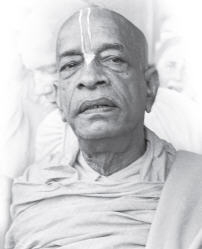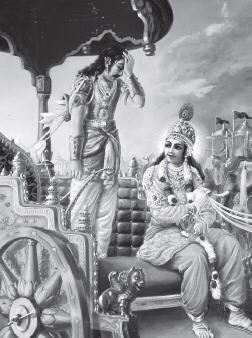Vrindavana, October 28, 1972

Bhakti means we should simply accept and do that which is favorable to Krishna.
Pradyumna: (reading) Originally in Bhakti-rasamrta-sindhu, the ocean is divided like the watery ocean into east, west, north, and south, while the sub-sections within these different divisions are called waves. As in the ocean, there are always different waves, either on the eastern side, the western side, the northern side, or the southern side, so similarly Bhakti-rasamrta-sindhu has different waves. In the first part there are four waves, the first being a general description of devotional service. The second concerns the regulative principles for executing devotional service and the third wave is devotional service in ecstasy. In the fourth is the ultimate goal, love of God. These will be explicitly described, along with their different symptoms. The authorized description of bhakti, or devotional service.”
Eternal Relation
Prabhupada: When Caitanya Mahaprabhu was speaking to Rupa Goswami, He said, “Bhakti is just like an ocean. I’ll take a drop of it, and you taste it, and you’ll understand what this ocean is.” Just like by tasting one drop of sea water we can understand the taste of the whole ocean, similarly Caitanya Mahaprabhu described a small portion of Bhakti-rasamrta-sindhu. Bhakti rasa amrta. In bhakti, devotional service, there is a rasa, taste, and the taste is amrta, eternal.
Here also, we have got a taste for any relationship. Just like we have our relationship with master and servant, this relationship is a perverted reflection of the real master and servant. Here it is perverted because the master does not love the servant, and the servant also does not love the master. The servant serves the master so long as there is payment. If the payment is stopped, then the servant will not be available anymore. But in the spiritual world, Krishna’s servants are eternal; that is eternal, without any payment. Mama janmani janmanisvare bhavatad bhaktir ahaituki [Siksastaka 4]. Ahaituki. The servants of God, or Krishna, they serve Krishna not for any material gain. Ahaituki, without any cause of motive. This is real bhakti. Therefore this bhakti word is applicable only in relationship with God, or Krishna. In the material world, there cannot be any use of the word bhakti, because here the so-called devotional service is motivated. So this bhakti word is monopolized by Krishna, and nobody else. Go on.
First Class
DEVOTIONAL SERVICE
Pradyumna: “The authorized description of bhakti, or devotional service, following in the footsteps of previous acaryas can be summarized in the following statement of Srila Rupa Goswami: ‘First-class devotional service is known by one’s tendency to be fully engaged in Krishna consciousness, serving the Lord favorably.’ ”
Prabhupada: Yes.
anyabhilasita-sunyam
jnana-karmady-anavrtam
anukulyena Krishnanu-
silanam bhaktir uttama
[Brs. 1.1.11]
This is the first statement of bhakti given by Srila Rupa Goswami. “First class devotional service is known by one’s tendency to be fully engaged in Krishna consciousness, serving the Lord favorably.” Not unfavorably. Anukula, pratikula. Anukulyasya sankalpa pratikulyasya varjanam. Bhakti means we should simply accept what is favorable to Krishna. That which is not favorable to Krishna, we shall not accept.
Just like Arjuna, in the beginning he declined to fight. He was thinking favorably to his own senses, “If I kill my brother, grandfather, nephews, who are on the other side…they have come to fight with me so I can kill them. I can own victory over them, but what is the profit? If my relatives, friends, and all others die, then what is the use of my becoming victorious?” That means he was thinking in his favor. But Krishna wanted: “You must fight. You are a kshatriya. It is your duty to fight. You are My friend. If you go away, from this battlefield, what will people say? That ‘Krishna’s friend has gone away.’ So this is not good.” When Arjuna was not convinced, Krishna spoke the whole Bhagavad-gita. After speaking Bhagavad-gita, Krishna inquired from Arjuna, “What is your decision now? Are you going to fight or not?” Arjuna said, “Yes, my illusion is over.” Nasto mohah smrtir labdha tvat-prasadan maya-cyuta…karisye vacanam tava: “Yes, I shall fight.” [Bg. 18.73] This is favorable to Krishna.
We have to see what is favorable to Krishna, not see sense gratification “not favorable to me, or to my country, or to my society.” No self-interest; only Krishna’s interest. That is bhakti. So by fighting, Arjuna became a great devotee. Bhakto ’si priyo ’si me [Bg. 4.3]. Krishna certified, “You are My greatest devotee. You are My very confidential friend.” But what did he do? He did not read Vedanta philosophy. He was a grihastha, a king, engaged in fighting. He knew how to fight only. He did not know what is Vedanta philosophy. But still he became a great devotee of Krishna. Bhakto ’si. So what is the criterion? That he fought favorably.
Lust isn’t Love

The difference between kama and prema is described in the Caitanya-caritamrta. Prema is love, and kama is lust. They appear similar. In the material world, lust is going on in the name of love. A boy loves a girl, a girl loves a boy, but actually the boy wants sense gratification and the girl also wants sense gratification. That is not love. As soon as there is any difficulty in sense gratification, immediately there is divorce. So there is no love in the material world. There is only lust. Therefore the author of Caitanya-caritamrta has distinguished between love and lust. He says, atmendriya-priti-vancha tare bali kama. When you want to satisfy your senses it is called lust. Krsnendriya-priti vancha dhare prema nama: when you want to satisfy the senses of Krishna, that is love. [Cc. Adi 4.165]
Just like Arjuna, in the beginning he wanted to satisfy his own senses. “I shall not fight because if the other party, my brothers and grandfathers live, I shall be happy.” So that is kama. That is not prema. But then he agreed to fight because Krishna wanted it… Nimitta-matram bhava savya-sacin: “O Arjuna, you can be but an instrument in the fight.” So that is prema. So Krishna-prema can be executed in so many ways. Simply Krishna should be satisfied. That is prema. That is Krishna consciousness. So at the present moment, Krishna, in the Bhagavad-gita wanted: sarva-dharman parityajya mam ekam saranam vraja [Bg. 18.66]. Krishna wanted Arjuna meaning everyone to surrender to Krishna and be engaged in the service of Krishna, the Supreme Personality of Godhead.
So this Krishna consciousness movement is propagating to serve Krishna. Krishna demanded, “You surrender unto Me,” and we are preaching, ‘You surrender unto Krishna.’ What is the difference? There is no difference. We Hare Krishna people preach the same thing that was spoken five thousand years ago by Krishna personally. We don’t change. We present, therefore, Bhagavad-gita As It Is. Krishna says that everyone should surrender unto Him. We are preaching the same philosophy that ‘You surrender to Krishna.’ Krishna says man-mana bhava mad-bhakto mad-yaji mam namaskuru [Bg. 18.65]. We say the same thing. We ask everyone that ‘You become a devotee of Krishna. You think of Krishna constantly. You worship Krishna. You offer you obeisances unto Krishna.’ So this is favorable. If we preach what Krishna said five thousand years ago, that is favorable. That is Krishna consciousness. To act in favor of Krishna means Krishna consciousness movement.
Thank you very much.
